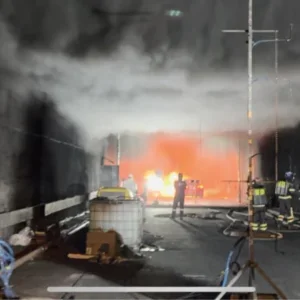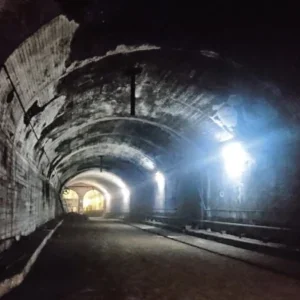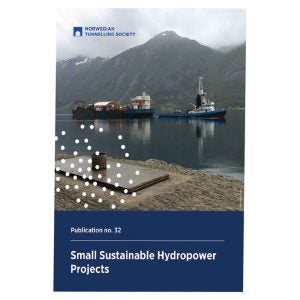Ask young engineers in the UK about domestic TBM manufacture and you might draw some blank stares.
Homegrown capabilities are almost unheard of, certainly under-represented by the media, and are part of a wider malaise afflicting the UK manufacturing sector. The UK “does not build things” is the common refrain. It is some decades since the great prestige tunnelling project, at least on native soil, for the major UK-based heavy manufacturer Markham.
In 1984/85 it manufactured three slurry shields under licence to Okumura of Japan. In 1987 it was awarded the contract for two 8.36m-diameter Channel Tunnel TBMs in joint venture with Robbins. In the mid 90’s, under licence to Kawasaki Heavy Industries, they supplied a UK built slurry TBM to Nishimatsu for the Docklands Light Railway extension from Canary Wharf under the Thames to Greenwich, followed by numerous smaller projects for LU.
Exit from tunneling
So where did Markham go? Well, nowhere far away. The company has quietly been producing major TBM components ever since for JV partners TBM suppliers on many various international projects, along with large design and build products in other engineering markets. But in terms of full TBMs, after the decision was made to close the Markham facility in Chesterfield and move in with Davy in Sheffield in the late 1990s.
The merger, orchestrated by then-owners Kvaerner, was more complex and expensive than expected, with a lot of plant needing to be moved. This was due to different machine tools and fabricating skills used by the two entities. DavyMarkham then looked at the projected opportunities for tunnelling and it was meagre compared to other products in their design and build portfolio. So as a TBM supplier, DavyMarkham pulled out of the business.
John Lindley, who left the industry when Markham left the tunnelling market and now newly re-appointed as sector lead of DavyMarkham’s tunnelling business adds, “A great deal of time and effort went into bidding UK projects around that time such as the Jubilee line, and when all the TBM’S went overseas it was seen that there was a degree of short termism by both the UK government and industry, this was a major factor in our decision to pull out of the market.”
However the number of upcoming infrastructure projects in the UK coupled with a changing environment increasing the focus on the sustainability of U.K industry has fuelled a new enthusiasm within DavyMarkham. They certainly have the facilities, one of the largest machine shops in Europe coupled with fabrication and an assembly facilities covered by a 350t lift capacity and all under one roof in Sheffield. In 2010 DavyMarkham was bought by an Indian concern, IVRCL. According to Bill Clark, (the new chief executive under new owners Hughes Armstrong) the previous owners were more focused on the Indian market.
Some difficulties there led to it neglecting the UK business and DavyMarkham started to decline in other sectors. Then, in October 2014, the ailing company was “returned home” by UK-based industrial group Hughes Armstrong Industries, as it acquired Davy Markham from IVRCL. And now, with homegrown management and a domestic tunnelling industry in the ascendancy, Davy Markham is setting its sights on the underground.
Northern powerhouse
Although the company never stopped manufacturing major TBM components the observation by DavyMarkham management is that you need market confidence in your operation. As a result they do not intend to go back into supplying fully integrated DavyMarkham TBM’s immediately. For the moment, as it did with the Channel Tunnel machines three decades ago, and DLR, the company will go into joint venture. This was initially to be with Robbins, but due to the recent merger between the US-based TBM manufacturer, NFM of France and NHI of China, it looks more likely that DavyMarkham will join up with the NFM side of the business for upcomming U.K projects such as High Speed Two (HS2). This is to keep in line with EU requirements.
Part of society
Clark sees HS2 as part of a wider push to consider socioeconomic factors in UK construction. The project is about linking the country together, and while this is going on there is a culture shift emerging in UK construction. Particularly with regards to linking local supply chains together, health and safety and environmental concerns.
“It’s a sensitive subject, and wasn’t very high on the list of priorities during the Jubilee Line,” says Clark. “I think the reality is that in the civil engineering community there’s a lot of decisions that are being made by project-oriented people without looking at the wider impact. And I think companies are trying to alter this now. There is an effort by the construction industry to understand the benefits of having a strong and healthy manufacturing industry.
“There is an interesting discussion as to whether the construction industry sees itself as part of the economy, or whether it is a service provider that presents a low-price solution when someone asks for it. A large chunk of what contractors take on is subcontracted, and the reality is that they don’t fully appreciate the socio-economic impact of some of the decisions they make on training, apprenticeships, employment. Skills are lost as a result of short-termism. I think the increased emphasis that HS2 is bringing to these areas is welcome.”
Clark argues that historically the UK manufacturing industry has been on the receiving end of some questionable decision-making. The privatisation of businesses that used to invest a lot of money and time training people has been wholly negative, in his view.
Clark highlights the Central Electricity Generating Board, the water companies and British Steel as all being involved in fairly major investment and training schemes. This all stopped with privatisation. “And with it we have seen a general decline in the quality of capability, so it causes me a great deal of concern that I am a civil/structural/water engineer now at the helm of such an important engineering/manufacturing resource. But the reality is with more collaboration and the quality of people still in manufacturing, there is not a whole host of people saying we cannot succeed.”
One of the things businesses in this sector can do to help themselves and wider industry, and something that Davy Markham is trying, is to reach out to look at where partnerships between engineering, manufacturing and academia can work together. For an example that isn’t from tunnelling, take spent nuclear fuel casks. No one in the UK makes them, but DavyMarkham, and partners Nuvia and Sheffield Forgemasters, have the capability to design and manufacture them. So the company is looking at getting the design and manufacture together, and has picked up on 40 PhD students at the local Sheffield University studying nuclear waste.
What then takes place is a process of gently putting together R&D collaboration bids according to Clark. “However, the government needs to set the agenda for universities to collaborate more with industry to win investment.”
Level Playing field
Further to the socio-economic concerns, and constituting a significant challenge to UK manufacturing, is artificial competition. While not looking for handouts, manufacturing in the UK is being hit by the heavy steel subsidies enjoyed by Chinese industry. This in turn feeds into manufactured components and false economies. Artificial competition.
Local stockists and local suppliers bring environmental benefits. Davy Markham’s view is also that steel processes in Europe have far greater CO2 awareness than steel processes elsewhere. “We need to see more transparency over pricing and cost in Europe. The subsidies we are seeing on imported steel need to stop. If other European countries are buying this steel, how is it ok to gain that advantage?”
If the client writes CO2 requirements into tenders, it can galvanise the supply chain and makes people see they are part of the bigger picture. “The debate is not just about plate. That misses the point of the argument over steel. It is about everything that the subsidised steel is then used to create.”
Further challenges
As for more general challenges that DavyMarkham will face re-entering the industry as an active manufacturer, Lindley believes that in the past there has been an over dependency on one manufacturer, however alternative suppliers are being selected for upcoming U.K projects such as Tideway and the Northern Line Extension demonstrating a more open attitude in the market. “It will be a challenge convincing the HS2 consortia groups that Robbins/NFM designed machines can be supplied out of the U.K, but we have the advantage of localised service and support and we have already started our preparations with the strong local supply chain. ”
Clark concludes: “It’s a funny old world this business of ours. There’s an overlap between TBM manufacture and EPC. How do you actually differentiate the different critical success factors that go with construction, and how different are they to manufacturing. The truth is they are very, very similar. Except for the fact that in manufacturing, you are working on a site that you control all the time. “A key part of it is bringing together all the different pieces of the puzzle: different perspectives, standards and cultures for the final product. We are a projects business and need to get the engineering right, the project management right, and the supply chain right. The way we hope to differentiate ourselves is by being more flexible, more adaptable than our competition. More focused on what people want rather than presenting one way of doing things.”
It should be noted that TBM manufacturers have historically enjoyed success when sold to companies able to focus on the industry and make quick decisions in a risky environment. When managed from a distance or centrally, the reverse has been true in several wellknown instances






